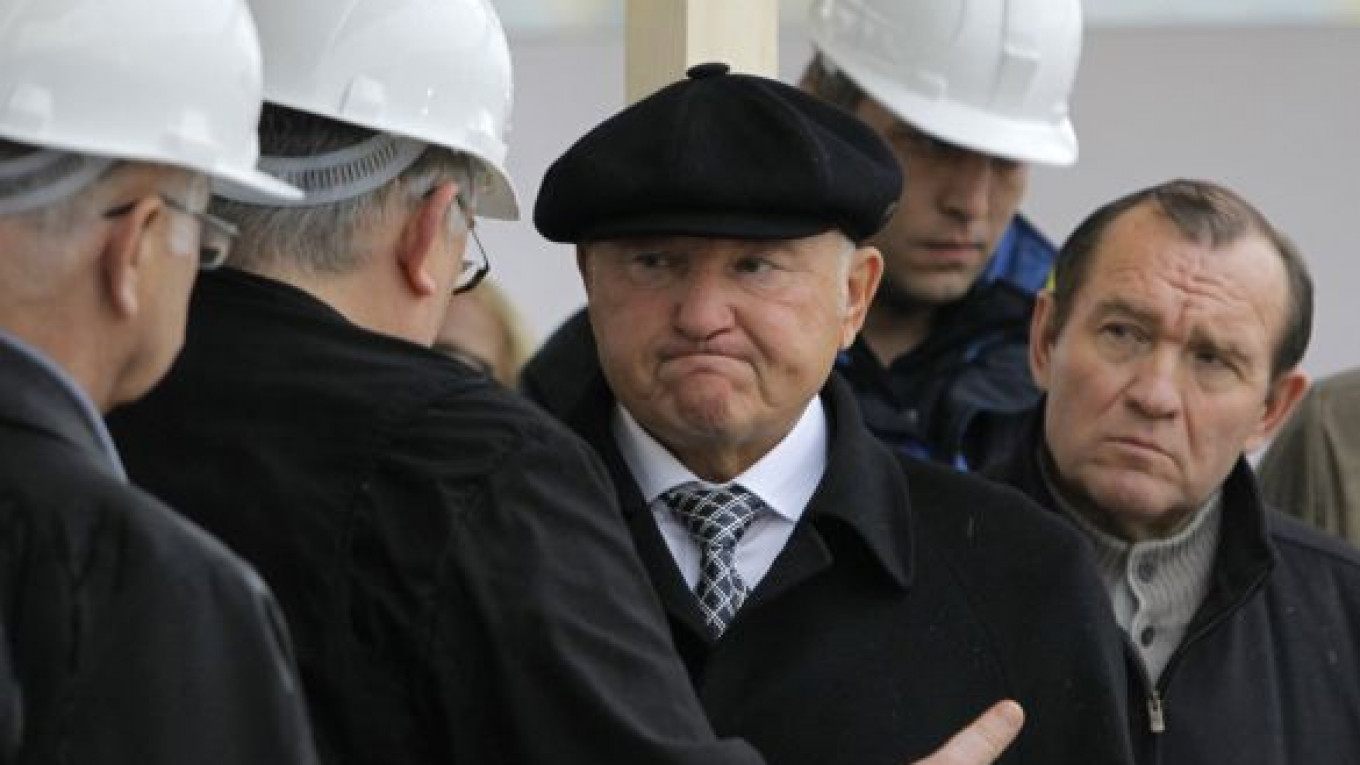Under the fire of a smear campaign, Mayor Yury Luzhkov lashed out at the federal authorities over migration laws, promised new metro stations and then announced that he was leaving for vacation in Austria.
An unidentified Kremlin official told RIA-Novosti that Luzhkov "needs time to think."
NTV television, which initiated the smear campaign by airing a program accusing Luzhkov of corruption Sept. 10, suggested in its "Russian Sensations" program on Saturday that City Hall was "living off the hand of" businessman Telman Ismailov, owner of the closed Cherkizovsky Market, and said Inteko, the construction company owned by Luzhkov's billionaire wife, Yelena Baturina, "began its ascension" after Luzhkov became mayor in 1992.
Luzhkov told reporters Saturday that he would leave for Austria this week for a family vacation and celebrate his 74th birthday there Friday. Luzhkov's birthday is on Sept. 21.
Luzhkov did not elaborate on the date of his departure or the duration of the vacation, but a source close to Luzhkov told RIA-Novosti on Sunday that Luzhkov was already in Austria, where he owns a chalet.
The Kremlin authorized Luzhkov to take a weeklong vacation, RIA-Novosti reported, citing a Kremlin source. "It is clear that Yury Mikhailovich is going through a difficult period in his life, and he certainly needs time to think," the source said.
Amid speculation that President Dmitry Medvedev was behind the smear campaign, State Duma Deputy Viktor Ilyukhin suggested that the instigator might instead be Prime Minister Vladimir Putin's government.
"I don't think that these attacks are coming from Staraya Ploshchad, but from the embankment," Ilyukhin, a Communist, told Svobodnaya Pressa, referring to the locations of the Kremlin offices and the White House. "It's there where all the contenders for the post of Moscow mayor work."
Meanwhile, Deputy Prime Minister Sergei Ivanov, seen by some observers as a possible replacement for Luzhkov, denied speculation that he might become the next Moscow mayor.
"I am staying to work in the government," Ivanov said, RIA-Novosti reported.
Luzhkov's council of elder statesmen, comprised of former city officials who advise the mayor on his policies, wrote an open letter Friday accusing national television channels of participating in the "unprecedented hounding" of Luzhkov, "evidently on the order of powerful forces," RIA-Novosti reported.
Luzhkov struck a populist note during a trade union meeting Saturday, accusing the Federal Migration Service of impeding his plans to reduce the number of migrants in the city by allowing migrants to buy work licenses.
The migration service "doesn't give a damn about the quotas" that City Hall sets for migrant workers, Luzhkov told the Federation of Independent Professional Unions of Russia at a meeting also attended by Putin.
The work licenses were introduced by amendments to migration law that took effect in July.
Suggesting that migrants take jobs away from Muscovites, Luzhkov said City Hall every year reduces its quota for migrant workers by 70,000 to 100,000 people. He did not elaborate.
On the sidelines of the meeting, Luzhkov said several new metro stations would be constructed in Moscow's eastern Kozhukhovo and southeastern Zhulebino districts in the next few years.
He praised unions for contributing to "the lowest unemployment level" in Moscow, compared with the rest of Russia.
Luzhkov also suggested that the State Duma introduce quotas on disabled employees at factories.
Separately, a feud erupted between City Hall and the Duma on Friday when the Duma challenged a 40,000 ruble ($1,300) fine for parking violations.
City Hall accuses the Duma of illegally cordoning off parking lots on Georgiyevsky Pereulok and Ulitsa Okhotny Ryad for Duma deputies.
Also Friday, Luzhkov took a step toward dealing with the city's traffic problem — a feature of the smear campaign — by submitting a bill to the City Duma that would allow municipal workers to evacuate cars parked on sidewalks, Interfax reported.
A Message from The Moscow Times:
Dear readers,
We are facing unprecedented challenges. Russia's Prosecutor General's Office has designated The Moscow Times as an "undesirable" organization, criminalizing our work and putting our staff at risk of prosecution. This follows our earlier unjust labeling as a "foreign agent."
These actions are direct attempts to silence independent journalism in Russia. The authorities claim our work "discredits the decisions of the Russian leadership." We see things differently: we strive to provide accurate, unbiased reporting on Russia.
We, the journalists of The Moscow Times, refuse to be silenced. But to continue our work, we need your help.
Your support, no matter how small, makes a world of difference. If you can, please support us monthly starting from just $2. It's quick to set up, and every contribution makes a significant impact.
By supporting The Moscow Times, you're defending open, independent journalism in the face of repression. Thank you for standing with us.
Remind me later.






